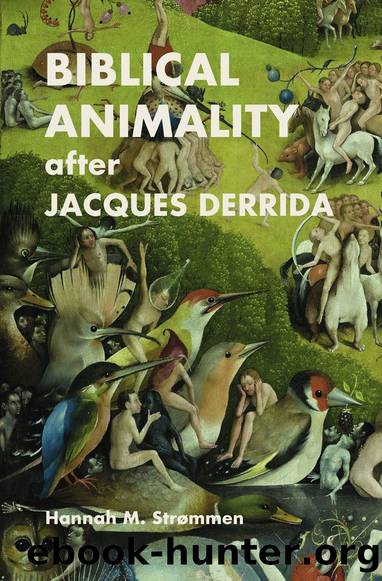Biblical Animality after Jacques Derrida by Hannah M. Strommen

Author:Hannah M. Strommen [Strommen, Hannah M.]
Language: eng
Format: epub
ISBN: 9781628372120
Amazon: 1628372125
Barnesnoble: 1628372125
Published: 2018-07-13T17:14:58+00:00
2. acts of eating
85
draws attention to the evocation of Gen 1:24â25, 6:20, and 7:14 in the animal categories of Peterâs vision as a form of gentile christian apologetic that is arguing against mosaic regulations by appealing to âthe original intent of the creator, in this instance, the goodness of creation.â Hence, the visionâwith its different kinds of animals that mirror the groups of animals in Genesisâis revealing the goodness of al creation, without separation between animals as clean or unclean. Difference is preserved without qualitative distinctions. if the link between gentiles as clean and thus fellows is so clear, then why is the relation to animals as those who first became clean not equal y clear? is not the vision of animals as clean the precise ground upon which an understanding of clean gentiles is founded?
The transformation of the category of gentile to be considered clean and thus included in Peterâs mission and fellowship is founded on the transformation of animals from partial y clean to completely clean. Thus, animals too are to be considered fellows, included in this hospitality. flipping the figurative reading of clean animals as real y about human gentiles, it might be claimed that Peterâs vision is about allâbe they human or nonhuman animalsâas clean animals. as all animals and cornelius are now considered clean, there is a cessation of any stark and absolute distinction between the human and animal. While i suggest this could imply the killability and edibility of al , it could also imply the possibility of hospitality and fellowship with al .
The animals of the vision arguably form the foundation of fellowship and hospitality. rather than an indiscriminate kil ability, then, the vision could be said to entail an unconditional hospitality. in this sense, acts 10 could indeed be read as a universalizing move, not in the exclusively human terms usual y assumed or merely in regard to the Jewish-gentile and Jewish-christian-roman relationships but in a larger embrace of animals as fellows. This expansive inclusion might not be simply a utopian dream.
There appear to be glimpses of such possible inclusive practices among the early followers of Jesus. Despite influential figures such as augustine who argued against any community shared by animals and humans, there were Jewish christians who saw Jesus as a vegetarian (Grant 1999, 11).
Grant writes that there are reports of James the brother of Jesus avoiding meat, and some claimed that the apostle matthew ate seeds, nuts, and vegetables. later, the manichees and the marcionites were to reject the eating of meat (11). in the so-called apocryphal acts, there are multiple animals that play central roles, testifying to a potential in early christianity for a greater regard for animals. in her study Animals in the Apocryphal Acts
86
Biblical animality after Jacques Derrida
of the Apostles: The Wild Kingdom of Early Christian Literature, Janet e.
spittler (2008) discusses the significance of animals in all five of the major apocryphal acts of the apostles: the acts of John, acts of Peter, acts of andrew, acts of Paul, and acts of Thomas.
Download
This site does not store any files on its server. We only index and link to content provided by other sites. Please contact the content providers to delete copyright contents if any and email us, we'll remove relevant links or contents immediately.
The Secret Power of Speaking God's Word by Joyce Meyer(3220)
Signature in the Cell: DNA and the Evidence for Intelligent Design by Stephen C. Meyer(3138)
Real Sex by Lauren F. Winner(3023)
The Holy Spirit by Billy Graham(2953)
The Gnostic Gospels by Pagels Elaine(2531)
Jesus by Paul Johnson(2362)
Devil, The by Almond Philip C(2332)
23:27 by H. L. Roberts(2251)
The Nativity by Geza Vermes(2230)
Chosen by God by R. C. Sproul(2164)
All Things New by John Eldredge(2162)
Angels of God: The Bible, the Church and the Heavenly Hosts by Mike Aquilina(1969)
The Return of the Gods by Erich von Daniken(1946)
Angels by Billy Graham(1926)
Knowing God by J.I. Packer(1859)
Jesus of Nazareth by Joseph Ratzinger(1811)
The Gnostic Gospel of St. Thomas by Tau Malachi(1799)
Evidence of the Afterlife by Jeffrey Long(1790)
How To Be Born Again by Billy Graham(1782)
